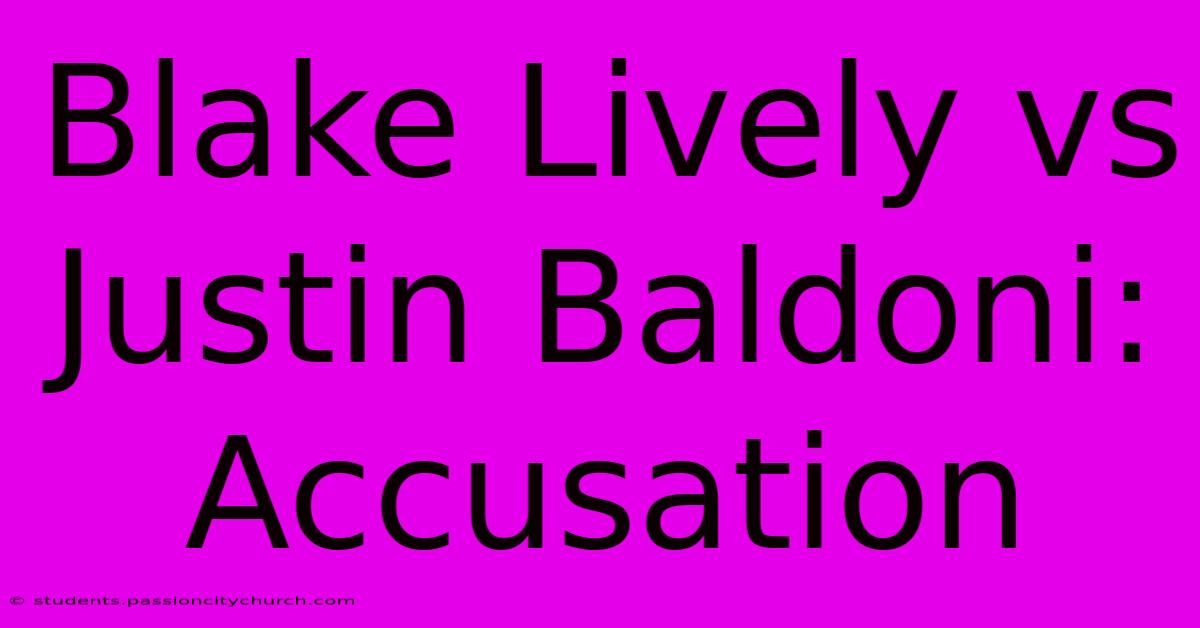Blake Lively Vs Justin Baldoni: Accusation

Discover more detailed and exciting information on our website. Click the link below to start your adventure: Visit Best Website. Don't miss out!
Table of Contents
Blake Lively vs. Justin Baldoni: Dissecting the Unfounded Accusation
The internet thrives on speculation, and sometimes, that speculation morphs into accusations that spread like wildfire. Recently, a rumor linking Blake Lively and Justin Baldoni in a negative light circulated online. This article will delve into the origins of this unfounded accusation, analyze its spread, and discuss the importance of responsible online behavior in the age of instant information. It's crucial to remember that no credible evidence supports any wrongdoing on the part of either Blake Lively or Justin Baldoni. This piece aims to clarify the situation and highlight the dangers of baseless claims.
The Genesis of the Rumor:
The exact origin of the accusation remains unclear. Many such rumors start with ambiguous social media posts, misinterpreted interactions, or even completely fabricated narratives. In this case, the rumor appears to have spread organically through various online platforms, including Twitter, Instagram, and gossip forums. The lack of a single, identifiable source makes tracing its initial inception challenging. However, the common thread seems to involve a misinterpretation of innocuous interactions between Lively and Baldoni, possibly amplified by existing biases or pre-conceived notions about either celebrity.
The Nature of the Allegation:
The core of the unfounded accusation varies slightly depending on the source. Some versions suggest a professional disagreement escalated into a personal conflict. Others hinted at a more serious, but equally unsubstantiated, allegation. Crucially, none of these claims have been supported by reliable evidence. No reputable news outlets have reported on this matter, nor have either Lively or Baldoni addressed the rumor publicly. The absence of any official statement from either party, or any credible evidence, should serve as a significant warning sign to those who encountered the claim.
Analyzing the Spread of Misinformation:
The rapid spread of this false accusation highlights the challenges of combating misinformation in the digital age. Several factors contributed to its proliferation:
- The Echo Chamber Effect: Online communities, particularly those focused on celebrity gossip, often reinforce pre-existing biases. Once a rumor takes hold within such a community, it quickly gains traction, with users sharing and amplifying it without critical evaluation.
- Lack of Fact-Checking: In the rush to share breaking news (or what is perceived as breaking news), many individuals fail to verify the accuracy of information. This is especially true for gossip-oriented content, where sensationalism often trumps accuracy.
- The Power of Visuals: Even if the original post lacked concrete evidence, the inclusion of seemingly relevant images or video clips could lend an air of legitimacy to the false narrative. Misleading edits or out-of-context footage can be easily weaponized to bolster false accusations.
- Algorithm Amplification: Social media algorithms often prioritize content that generates engagement, regardless of its veracity. This can inadvertently amplify false narratives, giving them wider reach than accurate, factual reporting.
The Importance of Responsible Online Behavior:
This incident underscores the critical need for responsible online behavior. Before sharing any information, especially those pertaining to individuals' reputations, it's crucial to:
- Verify the Source: Is the source reputable? Does it have a history of accurate reporting? Be wary of anonymous accounts or websites known for spreading misinformation.
- Consider the Evidence: Does the information presented include concrete evidence? Are there verifiable facts to support the claims? Hearsay and speculation should be treated with extreme skepticism.
- Think Before You Share: Sharing false information, even unintentionally, can have devastating consequences for the individuals involved. Consider the potential impact of your actions before posting anything online.
- Report Misinformation: If you encounter false or misleading information, report it to the relevant platform. This helps to limit the spread of misinformation and protect others from being deceived.
Protecting Reputation in the Digital Age:
For public figures like Blake Lively and Justin Baldoni, maintaining their reputation in the face of false accusations is a constant challenge. The internet offers a platform for anyone to voice their opinions, regardless of their accuracy. This makes protecting one's reputation incredibly difficult, requiring vigilance and a strategic approach to managing online presence.
Conclusion:
The unfounded accusation against Blake Lively and Justin Baldoni serves as a stark reminder of the potential dangers of misinformation and the importance of critical thinking in the digital age. The lack of any credible evidence should dissuade anyone from believing or perpetuating this rumor. Instead of engaging in baseless speculation, let's focus on promoting responsible online behavior and holding ourselves accountable for the information we share. The internet's power to spread information, both good and bad, necessitates a collective commitment to accuracy and ethical online conduct. The next time you encounter a sensational story online, remember to question its source, verify its facts, and choose to spread truth, not unfounded accusations.

Thank you for visiting our website wich cover about Blake Lively Vs Justin Baldoni: Accusation. We hope the information provided has been useful to you. Feel free to contact us if you have any questions or need further assistance. See you next time and dont miss to bookmark.
Also read the following articles
| Article Title | Date |
|---|---|
| 2 0 Celta Golea A Real Sociedad | Dec 22, 2024 |
| Rickey Henderson Baseball Legend Passes At 65 | Dec 22, 2024 |
| Tank Dells Knee Injury Hospitalization Confirmed | Dec 22, 2024 |
| Rickey Henderson Unbreakable Leadoff Record | Dec 22, 2024 |
| Nfl Week 16 Fantasy Injury Update | Dec 22, 2024 |
| Atletico X Barcelona Horario E Transmissao | Dec 22, 2024 |
| Significant Injury Tank Dells Hospital Stay | Dec 22, 2024 |
| Man City Aston Villa Kick Off Time And Prediction | Dec 22, 2024 |
| Partido Barcelona Atletico Hora Y Canal | Dec 22, 2024 |
| Arsenal Tumbangkan Crystal Palace | Dec 22, 2024 |
